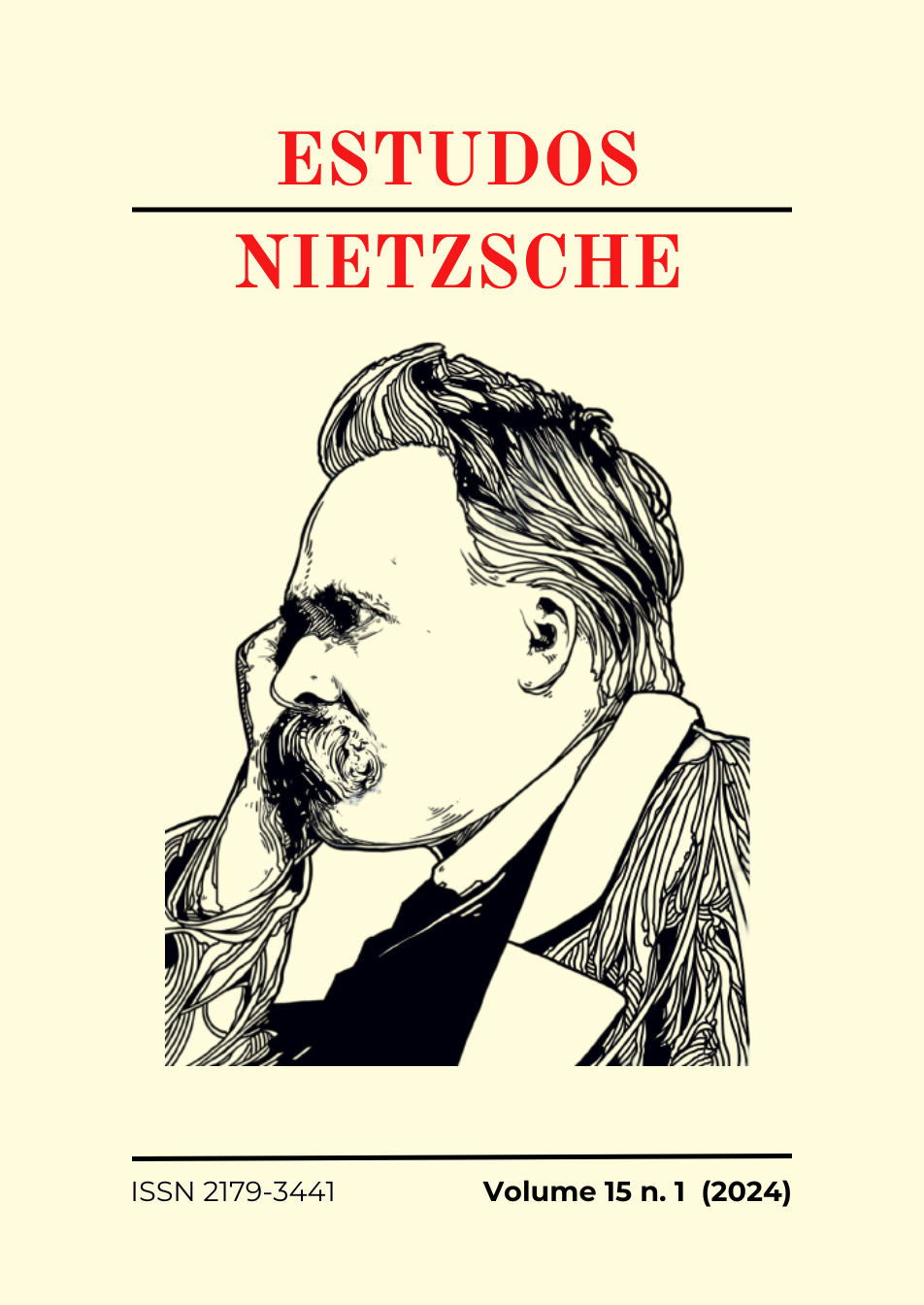O espírito cômico no pensamento de Nietzsche
DOI:
https://doi.org/10.47456/en.v15i1.43736Palavras-chave:
Desmascaramento, Genealogia, Metafísica, Riso, FicçãoResumo
O presente estudo busca oferecer uma interpretação da filosofia nietzscheana, explicitando, fundamentalmente, o papel do espírito comediante na elaboração de sua crítica da cultura. Desse modo, exploramos a crítica ao pensamento socrático-platônico, uma vez que esse pensamento – que se encontra na base de todo o Ocidente – acabou por invadir as mais diversas esferas da vida humana, tais como a arte, a ciência e a filosofia. Tal hegemonia, para Nietzsche, representa o processo de decadência da civilização, uma vez que tal pensar, longe de emergir de uma livre inventividade dionisíaca, nasce de uma necessidade de segurança de base. Institui-se, então, um modo de pensar que privilegia o que é estável e ideal, escamoteando o aspecto sensível e transitório da vida humana. É nesse contexto, então, que a experiência do sátiro comediante deve ser evocada. Para que se acesse essa experiência, entretanto, é necessário que o pensamento supere a moral de rebanho ensinada pela tradição, desmascarando-a e, por fim, instaurando o pensamento genealógico do espírito livre que, encarando o existir como um constante processo de criação ficcional, ama incondicionalmente a vida tanto em seu caráter luminoso como doloroso. A pretensão de se encontrar a “verdade” – juntamente com a atitude austera que lhe acompanha – é então abandonada, abrindo espaço para a atitude do sátiro que, transpassado pelo espírito da comédia e da dança, institui ficções úteis à vida.
Referências
HEIDEGGER, Martin. Ser e Tempo. 1. ed. Rio de Janeiro: Vozes, 2012.
NIETZSCHE, Friedrich. Aurora: reflexões sobre os preconceitos morais. 1. ed. São Paulo: Companhia de Bolso, 2016.
NIETZSCHE, Friedrich. A gaia ciência. 1. ed. São Paulo: Companhia das Letras, 2012.
NIETZSCHE, Friedrich. Além do bem e do mal: prelúdio a uma filosofia do futuro. 1. ed. São Paulo: Companhia de Bolso, 2006.
NIETZSCHE, Friedrich. Assim falava Zaratustra; um livro para toda a gente e para ninguém. 1. ed. Rio de Janeiro: Nova Fronteira, 2016.
NIETZSCHE, Friedrich. Ecce homo: como cheguei a ser o que sou. 1. ed. Rio de Janeiro: Nova Fronteira, 2016.
NIETZSCHE, Friedrich. Genealogia da moral: uma polêmica. 1. ed. São Paulo: Companhia das Letras, 2009.
NIETZSCHE, Friedrich. Humano, demasiado humano: um livro para espíritos livres, volume I. 1. ed. São Paulo: Companhia de Bolso, 2017.
NIETZSCHE, Friedrich. O nascimento da tragédia, ou Helenismo e pessimismo. 2. ed. São Paulo: Companhia das Letras, 1992.
NIETZSCHE, Friedrich. Sobre verdade e mentira no sentido extra-moral. 1. ed. São Paulo: Hedra, 2007.
NIETZSCHE, Friedrich. Vontade de Potência. 1. ed. Rio de Janeiro: Vozes, 2011.
REALE, Giovanni; ANTISERI, Dario. História da filosofia, 6: de Nietzsche à Escola de Frankfurt. 2. ed. São Paulo: Paulus, 2008.
VATTIMO, Gianni. O Sujeito e a máscara: Nietzsche e o problema da libertação. 1. ed. Rio de Janeiro: Vozes, 2017.
Downloads
Publicado
Edição
Seção
Licença
Copyright (c) 2024 Lucas Vieira

Este trabalho está licenciado sob uma licença Creative Commons Attribution 4.0 International License.
Ao submeter o artigo, resenha ou tradução para a Estudos Nietzsche, o autor cede à revista o direito à primeira publicação do texto, mantendo, contudo, o direito de reutilizar o material publicado, por exemplo, em futuras coletâneas de sua obra.






